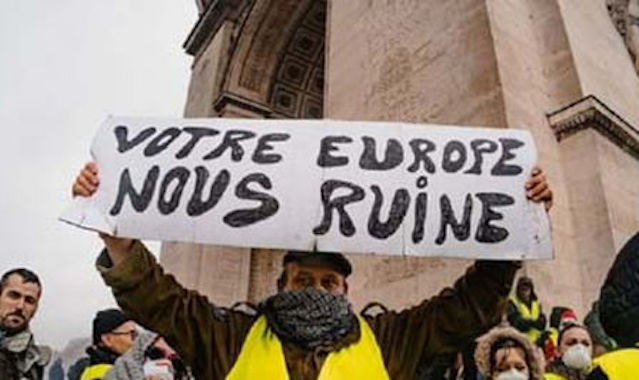
12 Nov Soutien au Full Brexit / Lexit !
Notre collectif soutient les groupes favorables à un « Lexit » partout en Europe. Nous avons traduit en Français pour le site Contretemps un article de Costas Lapavitsas , et vous trouverez ci-dessous un article de soutien envoyé au site britannique The Full Brexit, dans le cadre d’une campagne européenne de soutien au Brexit
The Promotion of European Identity” is a Form of Ruling-Class Warfare against Workers and Non-EU Immigrants
Ramzi Kebaïli
Publié le 30 Octobre 2019 sur https://www.thefullbrexit.com/frexit
The left must, of course, fight against the EU’s free market, which destroys our environment and our social protections. But we also need to fight against the national ruling classes who implement the EU agenda by pushing a “European identity”, as a subtle form of class warfare against workers and immigrants.
The European Union is not simply about a bunch of rootless treaties promoting neoliberalism. It is also about the promotion of a one-sided “European identity”, which legitimises both the steady degradation of the working class internally and, simultaneously, racist and imperialist policies externally. As a somewhat detached EU member-state, Britain has perhaps been more immune to this “European identity” than others – though the surging “Remainer” identity suggests it has been building in your country, too. This “European identity” embodies a way of life for a wealthy minority, which enjoys greater freedom to invest, travel, educate their children, and practice their professions across borders. But for most Europeans, it is a sort of economic and cultural war, launched not from outside of our societies, by some faceless “Brussels bureaucracy”, but rather from within.
The EU is an invention of national elites, who founded it to escape popular control and lock in neoliberal policies (see Analysis #1 – The EU’s Democratic Deficit: Why Brexit is Essential for Restoring Popular Sovereignty). Of course, Emmanuel Macron or Boris Johnson would pursue the same neoliberal policy inside or outside of the EU. But the EU was deliberately built to forbid any alternative, allowing national elites to pursue neoliberal policies even if a majority of their citizens disapprove. Even if a country elects a left-wing government, its economic agenda would be impossible inside the single market, let alone the Eurozone. And it would be pointless to beg to change the rules, which would require the approval of all other EU member-states (see Analysis #23 – The Folly of “Remain and Reform”: Why the EU is Impervious to Change). There is no democracy when a nation is not afforded to choose its own policies.
In the name of the European project, then, our national ruling classes deny popular sovereignty. This was made clear in France with the betrayal of the 2005 referendum on the EU Constitution (we rejected it; our ruling classes repackaged it as the Lisbon Treaty), and in Greece with the betrayal of the 2015 referendum on EU-imposed austerity, which the Syriza government and the Troika promptly ignored. Hopefully the UK, which has wisely kept its national currency, will recover the right to choose its own economic policy.
But if neoliberalism and austerity were all the EU offered, it would not get far; we must also understand the ideological “glue” which holds the edifice together. And this glue is the idea of the “European project” and the “European identity”. At first glance, “European Union” sounds like a generous and peaceful idea. But when you look more closely, you realise that the “European identity” promoted by the EU is deeply classist and racist. Even after decades of European integration, most working-class people don’t feel primarily “European”; they are generally attached to their respective countries, and they look to their national states for social and environmental protection – yet they find them unresponsive and uncaring, as their ruling elites collaborate across borders to lock in neoliberal rule. Most immigrant workers share the same class interests, and understand that Europe is nothing like the “peace project” it is made out to be. They know that, in practice, so-called “European values” has meant destructive free-trade agreements and bloody wars imposed on Africa and Asia by leading EU states.
“European identity” was built throughout centuries by our ruling classes, especially during the colonial era, when it was used to legitimise imperial domination in the name of the mission civilisatrice. Ultimately, this generated the imperialist wars that tore Europe apart. In the post-war period, “European identity” has become about overcoming our past conflicts, without identifying their roots. Nowadays, it is a project of the bourgeoisie, who feel closer to their counterparts in other countries than they ever did to their national working classes, and want to rule beyond any possible popular control.
In its most recent phase, “European identity” is becoming a way to solidify neoliberalism by once again co-opting racism and xenophobia into the EU project. Across the continent, EU elites are increasingly co-opting Islamophobia to shore up social order and unite the continent behind the EU project. The historian Shlomo Sand has warned us against the role that Islamophobia plays in the current continent-building effort. The new European Identitarian movement attacks the migrants under the “Defend Europe” banner, and the continental far-right has made a u-turn by promoting “European civilization” against the Islamic “other”. The EU has shifted towards the far right by creating a new Commission portfolio for “Protecting our European Way of Life”, which includes immigration control. This culture war is the way that European leaders hope to reconcile their far-right oppositions and avoid popular uprisings against austerity. All this proves that Europe is not a geographic entity, but a cultural one, and that it can be united only through the designation of an inner and outer enemy.
The Brexit debate seems totally divorced from this reality. British Remainers seem to think that the EU is a space of liberal values, tolerance, and free migration, while they attack Leave voters as xenophobes and racists. But we on the continent see it differently. We see how right-wing populists like Marine Le Pen and Matteo Salvini, having attacked the EU for many years, now come together around “remain and reform”, hoping to turn the EU into a vehicle for their policies. And even if they do not take power directly, they are clearly dragging national and EU level policies in their direction (see View from Europe #3 – The Future of the EU: Soldiers, Barbed Wire and Surveillance).
The key to fighting the European oligarchy is not sheltering within EU institutions, which are merely adopting politer forms of right-wing agendas. It is building an alliance of the working class in all its diversity. The French revolt of the “Gilets Jaunes” (Yellow vests) is exactly what our ruling classes fear. The key to unite people is to stress that the problem is the free movement of goods and money, and not the free movement of persons and cultures. Lexit differs from right-wing nationalism by implementing the necessary anti-capitalist reforms to solve economic and environmental crisis, and also by promoting a firm anti-racist agenda. This agenda is necessarily anti-imperialist: if we want to be independent from EU, we have to understand that former colonies also want to be economically and politically independent from our states. Cancelling poor countries’ debt and withdrawing French troops abroad would be a good first step.
Here in France, however, the main left-wing parties stay committed to the EU and euro, making only ambiguous pledges to reform “neoliberal Europe”. As a result, only the far right gains from popular anger against the EU, rather than the anti-austerity parties. The position of pro-European leftists is somehow paradoxical, because they promise to “reform” the EU to make it more favourable to French interests by threatening to withhold French contributions to the EU budget. This bullying tactic is supposedly “internationalist”, but its proponents don’t realise that most other EU countries are not interested in French ideas of EU reform. Conversely, our non-partisan campaign for a “Frexit de gauche” explains that a truly internationalist agenda consists in letting each country decide for itself, rather than being pushed around by more powerful member-states.
Independence doesn’t have to mean conflict or bitterness towards your former partner. A good divorce deal is the best road towards genuine cooperation. We are horrified to see that EU leaders, especially Emmanuel Macron, trying to impose a humiliating withdrawal agreement on Britain. They want either a fake Brexit or a very painful Brexit in order to deter other Europeans from following your path. But the French Lexiters support this “divorce” not because we would dislike you but, quite the contrary, because we respect your will. And we wish you the best!
About the authors
Ramzi Kebaïli is co-founder of the campaign Pour un Frexit de Gauche, and author of Quittons l’Europe! Pour une souveraineté populaire et inclusive (Bookelis, 2019). For an interview with Ramzi on his campaign (in French), click here.


Pas de commentaires